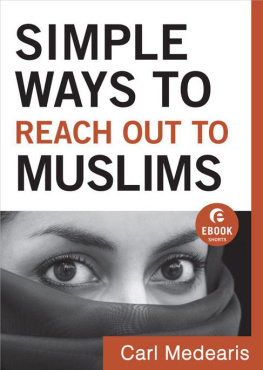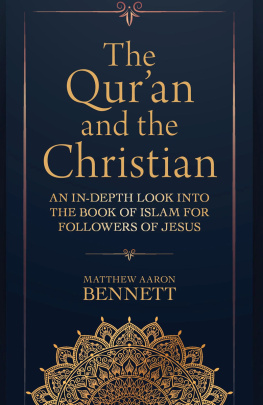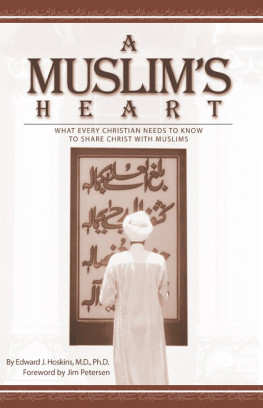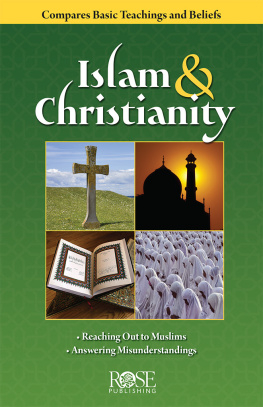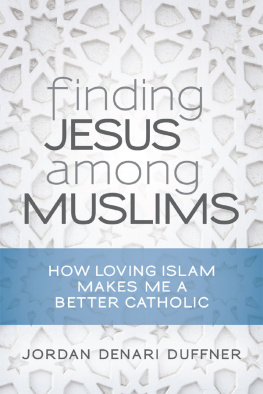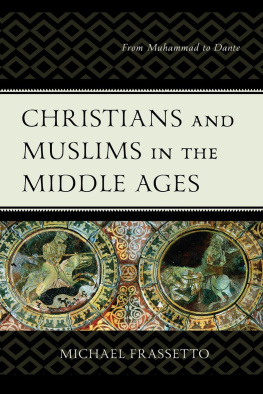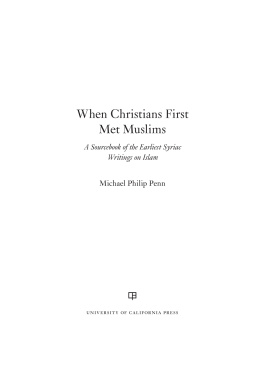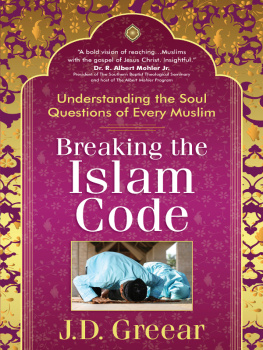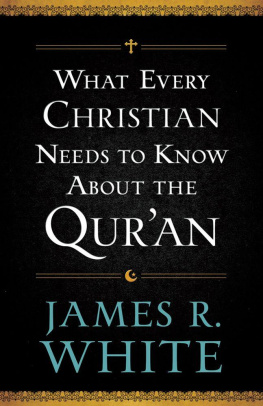Simple Ways to Reach Out to Muslims
Carl Medearis

2008 by Carl Medearis
Published by Bethany House Publishers
11400 Hampshire Avenue South
Bloomington, Minnesota 55438
www.bethanyhouse.com
Bethany House Publishers is a division of
Baker Publishing Group, Grand Rapids, Michigan.
www.bakerpublishinggroup.com
Ebook edition created 2012
The material in this ebook is a selection from Muslims, Christians, and Jesus by Carl Medearis.
All rights reserved. No part of this publication may be reproduced, stored in a retrieval system, or transmitted in any form or by any meansfor example, electronic, photocopy, recordingwithout the prior written permission of the publisher. The only exception is brief quotations in printed reviews.
ISBN 978-1-4412-6062-8
Library of Congress Cataloging-in-Publication Data is on file at the Library of Congress, Washington, DC.
Cover design by Dan Pitts
To Chris.
This book is as much your story as it is mine.
Without you I wouldnt understand people
or love God like I do.
Acknowledgments
Two friends have encouraged me for years to write down these thoughts for others to read: Ted Dekker and Floyd McClung. Thank you, dear friends, for believing in me and for pushing me to stop running long enough to sit quietly and write.
Also a huge and special thank-you to my dear friend Samir K. You helped me understand Jesus in new ways and introduced me to the Arab world at a level far beyond my capability. Youre the best.
Contents
Introduction
This book began in 1983, when I first went to the Middle East. Back then, the majority of Americans, like me, knew little about the Middle East or Islam. The Reagan administration was in its first term, and Communism and the Cold War crowded the headlines. Baath-party socialist Saddam Hussein had been in power for only four years, and the secular government of Iraq was at war with its Shiite neighbor, the Islamic Republic of Iran. The news also brought us occasional stories about the Afghan campaign against Soviet troops, Libyas Muammar Khaddafi as a top-shelf bad guy, and the Ayatollah Khomeini, who had replaced the CIA-sponsored Shah of Iran. Still, there was little to no fear or suspicion of Islam in the West, mainly because the reality of terrorism was not yet on our doorstep. All was quiet on the Middle-Eastern front.
Until 2001.
As the world watched smoke and ash spew into the Manhattan sky on September 11, 2001, I was (ironically) busy teaching a bunch of students in Kansas City about loving Muslims. In fact, I had just drawn a diagram on the white board showing how we so often think in an us-versus-them paradigm. I was literally erasing the line between the words us and them when someone burst into the room in tears telling us what had happened. The next week, our family returned home to Beirut on one of the first flights out of a deserted Chicago OHare airport. For days after our arrival we received a steady stream of visits and calls from friends saying how sorry they were. One friend, Ahmed (not his real name), came by our house, slumped into our couch, and rubbed his face with his hands. Carl, he said, these terrorists have seriously hurt the peace we have worked so hard for.
What do you mean?
America will go to war, he said, shaking his head, and I am afraid that it will not end for years.
I know.
The West does not understand us. They see an Arab and they feel fear. They hear talk of Islam and they are suspicious. I am afraid that things will spiral out of control and that hatred will grow between my people and your people. He sighed. Again.
Ahmed, I said, looking him in the eyes, we are each others people. We are both followers of Jesus, friends of God, and brothers in a way that boundaries cannot take from us. A tear slid down his face and he tried to wipe it away before I noticed.
My family and I lived in Lebanon from 1992 until 2004. If 9/11 was going to rip the world apart, we were going to do everything we could to stop it. We had worked long to build friendships, and the last thing we wanted was to let them be torn away by international politics, hatred, and misunderstanding.
In 2003, I made two trips into Iraq. The war in Iraq had torn up the status quo by the roots, and my Iraqi friends were practically pleading with us to come over.
It was surreal, to say the least. At the border, we halted at a coalition checkpoint and for the first time in years I heard the Midwestern accent of an American in the middle of the desert: Welcome to Iraq; may I take your order? The troops were enthusiasticGIs doing their job. We shook hands, exchanged pleasantries, and hit the road again, southbound for Basra.
A few weeks later, my life nearly ended, along with the rest of the team. As we returned north on the route at 160 clicks per hour, we were overtaken by a black Mercedes with one notable distinction: rifles. We were forced to the shoulder and escorted out of sight into the sand, below the lip of a wadia dry riverbed. There we were dragged from our vehicle, then lined up in the sand on our knees, hearts pounding and palms sweating.
Let me tell you, when an AK-47 stares at you, you find an incredible capacity for introspection, along with a unique closeness to God.
I asked myself, If I had to do it all over again, would I spend my life in the Middle East, living among Arabs, trying to be a visible expression of Jesus to them?
I had my answer immediately. The Holy Spirit spoke inside of me so strongly that my body trembled. I heard the words I love these people.
Thats when I realized the truth: I loved these Arabs too. But it wasnt my love that drove meit was his love for them. I was simply a part of the story.
When my wife and I returned to the United States, we found that everyone wanted our opinions on the meaning of world events. It seemed that almost no one knew what to do, what to say, or even what to hope for.
I began to realize that because so many people were left wounded and vulnerable from the 9/11 attacks, they found it relatively easy to assume terrorism was synonymous with Islam, making it justifiable in their eyes to beat our plowshares back into swords. I know this is an observation that does not include all Westerners, Americans, or Christians. I also know I am treading on sensitive ground with this subject. But the causes of men were falsely aligned with the causes of God, linking our military successes to his will and broadcasting the message that God is on our side.
At least thats how my Arab friends saw it. The Christians are coming. Again.
After we had moved back to the United States, I received invitation after invitation to speak at universities, churches, and other places. I was puzzled by my newfound popularity. One day I realized the truth. It wasnt me that people were interested in; a thirst had awakened, a desire to become more familiar with this religion called Islam. My ego wasnt deflated at all. In fact, my heart surged with hope. Many Christians are now choosing the road less traveled, driven to learn about Islam and thirsty to see if there is a way to reach out to Muslims.
In fact, when Im askedas I often amwhat is the answer to the issues in the Middle East and I answer Jesus, I am often mocked as being simplistic, even by my committed Christian friends.
They are looking for a political answer that simply doesnt exist.
When I cant make sense of something, I pull everything back to its simplest point, stripping away the confusion and noisy complexities. What matters is what has always mattered:
Next page
